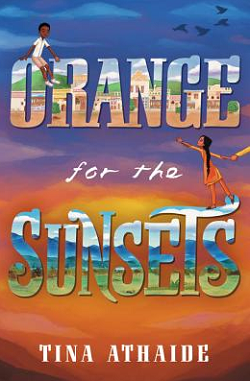
Orange for the Sunsets
Written by Tina Athaide
Katherine Tegen Books, 2019, 336 pp
ISBN: 978-0-06-279529-8
Set in 1972 in Entebbe, Uganda, Orange for the Sunsets is the story of a friendship between a young girl whose family is from India and a young boy whose family is from Uganda during President Idi Amin’s expulsion of Indians from Uganda. Tina Athaide’s novel uses alternating third-person narration between the two characters, Yesofu and Asha. The story opens at Asha’s birthday party at the Entebbe Club, a popular gathering place for affluent Indians in Entebbe. Yesofu shows up to give Asha a bracelet with beautifully colored beads for her birthday. However, we ascertain that there is tension between races and classes of citizens in Entebbe when Yesofu refuses to come into the party. Asha presses Yesofu on the issue of not coming inside to the party and asks him why he cares and who would care if he came in. He responds by saying, “Everyone! Your friends. Our parents. And me. I care. I’m not like you. My family works for your family” (p. 4). We come to understand that Yesofu is aware of his lower-class status in comparison to Asha’s family. This feeling of injustice sets the stage for the rest of the story.
As the story progresses, we begin to understand more about the origins of these racial and class tensions. After Britain left Uganda years prior, the British had seemingly appointed people from India as the ruling class in Uganda. Many wealthy Indian families hired Africans as servants, as was the case with Yesofu’s mother working as a servant for Asha’s family. Tensions continued to build when President Idi Amin was said to have had a dream where he pictured Africa as being returned to Africans. Asha and Yesofu have different opinions on this dream. Asha considers Uganda home and is sure that Idi Amin would never actually follow through, saying “President Amin dreamed a lot. A couple weeks ago he’d announced on the news that he had a dream where God spoke to him about getting rid of Indians. Good thing President Amin didn’t listen to his dreams” (p. 12). However, we become cognizant that Yesofu views this vision as an opportunity for he and his family to achieve their dreams– “For as long as he could remember, Yesofu’d wanted more than to go into the fields every day like Baba. Or to cook and clean for mzungu or Indians like Mama. There wasn’t anything wrong with it, but compared to finishing college or playing professional cricket? It wasn’t even a contest” (p. 33). As it turns out, Idi Amin does follow through with his vision of removing Indians from Uganda. Subsequently, Asha and her family, as well as other citizens from India, have 90 days to leave Uganda. Orange for the Sunsets focuses on those 90 days of conflict, unrest, confusion, and violence.
Tina Athaide lays out a genuine and authentic portrayal of two young people navigating a complicated friendship during a contentious time in their country. Asha has a hard time understanding why Yesofu supports Idi Amin’s policies, while Yesofu has a difficult time understanding how Asha can fail to see the oppression of Africans in their own nation. They both make sacrifices for their families and each other in their pursuit of freedom, justice, and equality.
Orange for the Sunsets is the 2020 winner of the Geoffrey Bilson Award for historical fiction for young readers. This story would be an ideal book to use in a middle-grade classroom to discuss complex issues about corrupt leadership/power, conflict, and social class. This novel would pair well with Linda Sue Park’s (2002) When My Name was Keoko, Thanhha Lai’s (2011) Inside Out and Back Again, Veera Hiranandani’s (2018) The Night Diary and Shenaaz Nanji’s (2008) Child of Dandelions. These novels have themes of immigration, forced resettlement, and/or corrupt leadership similar to Athaide’s Orange for the Sunsets.
In the Author’s Note, Athaide explains her inspiration for this novel as she and her family left Entebbe for Britain shortly after Idi Amin came to power in 1972. She states, “some of the details in this story have been fictionalized, but the major events are based on research, news articles, interviews with family and friends, as well as my own memories” (p. 315). Tina Athaide currently lives in California with her family. See her website for information on her biography and work.
Sara Logan, University of Arizona
© 2021 by Sara Logan

WOW Review, Volume XIV, Issue 1 by Worlds of Words is licensed under a Creative Commons Attribution-NonCommercial-ShareAlike 4.0 International License. Based on work by Sara Logan at https://wowlit.org/on-line-publications/review/xiv-1/11/

Thanks you! What an eye opening review!!!! So well written and dedicated to the truth of representing our daily lives, our first thoughts, our judgements. At 70 I reflect back on my life and realized at a younger age that I unknowingly judged sight, smell, touch, hearing and taste from my surroundings and events! It is so rewarding that at an early age our senses can be richly directed from reading these kind of observed stories. Opening our eyes and hearts to knew horizons!